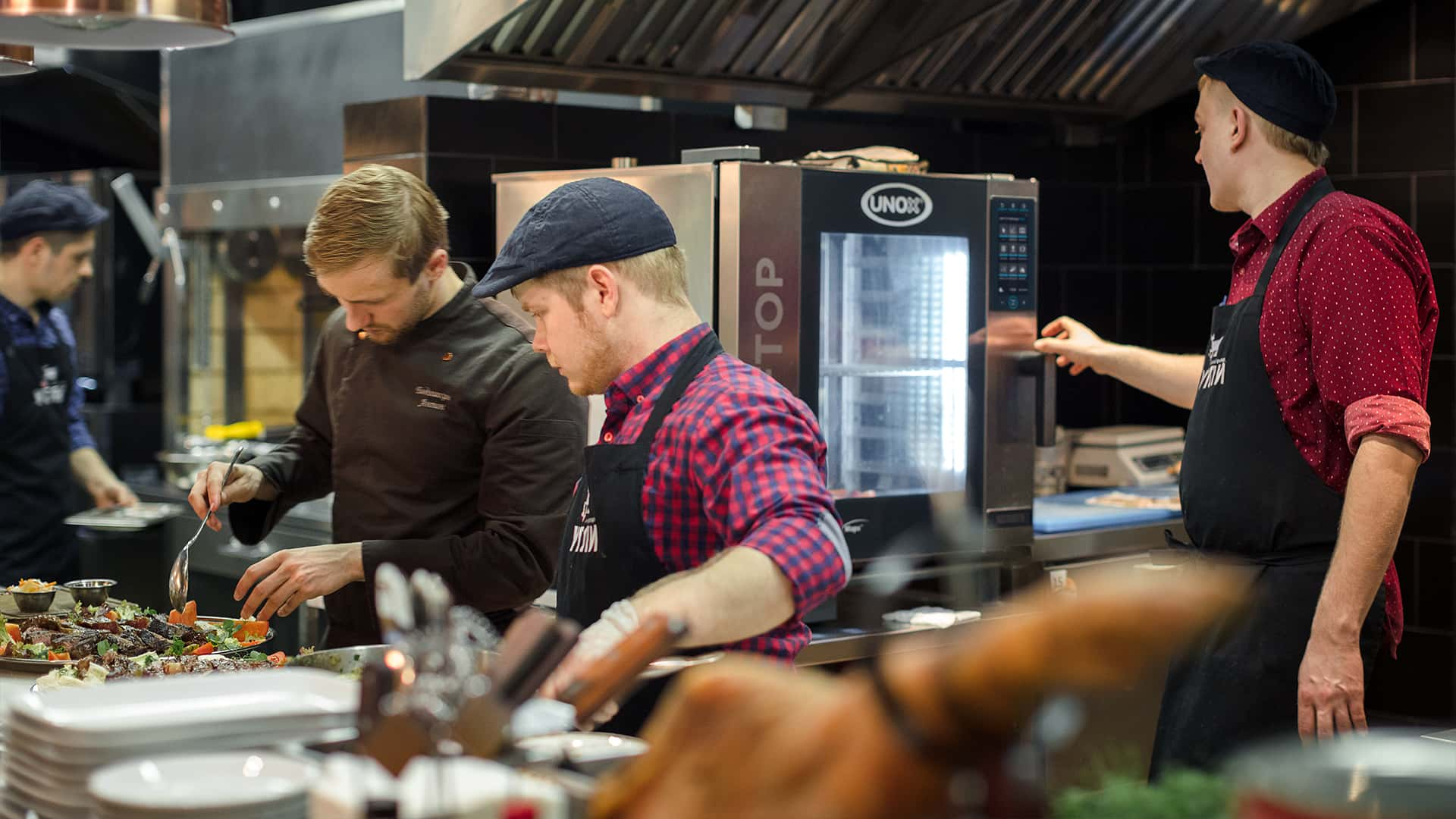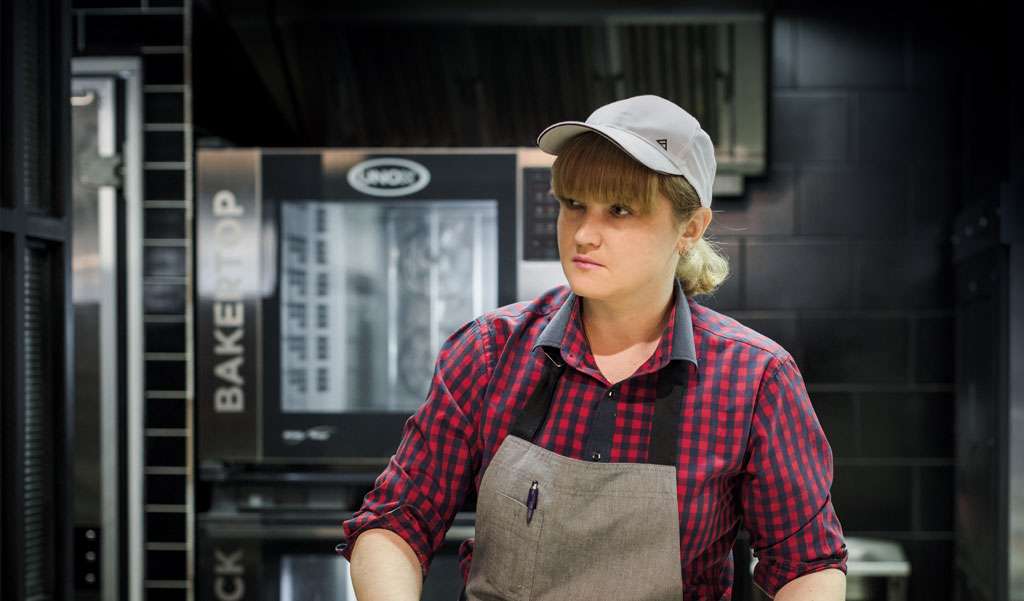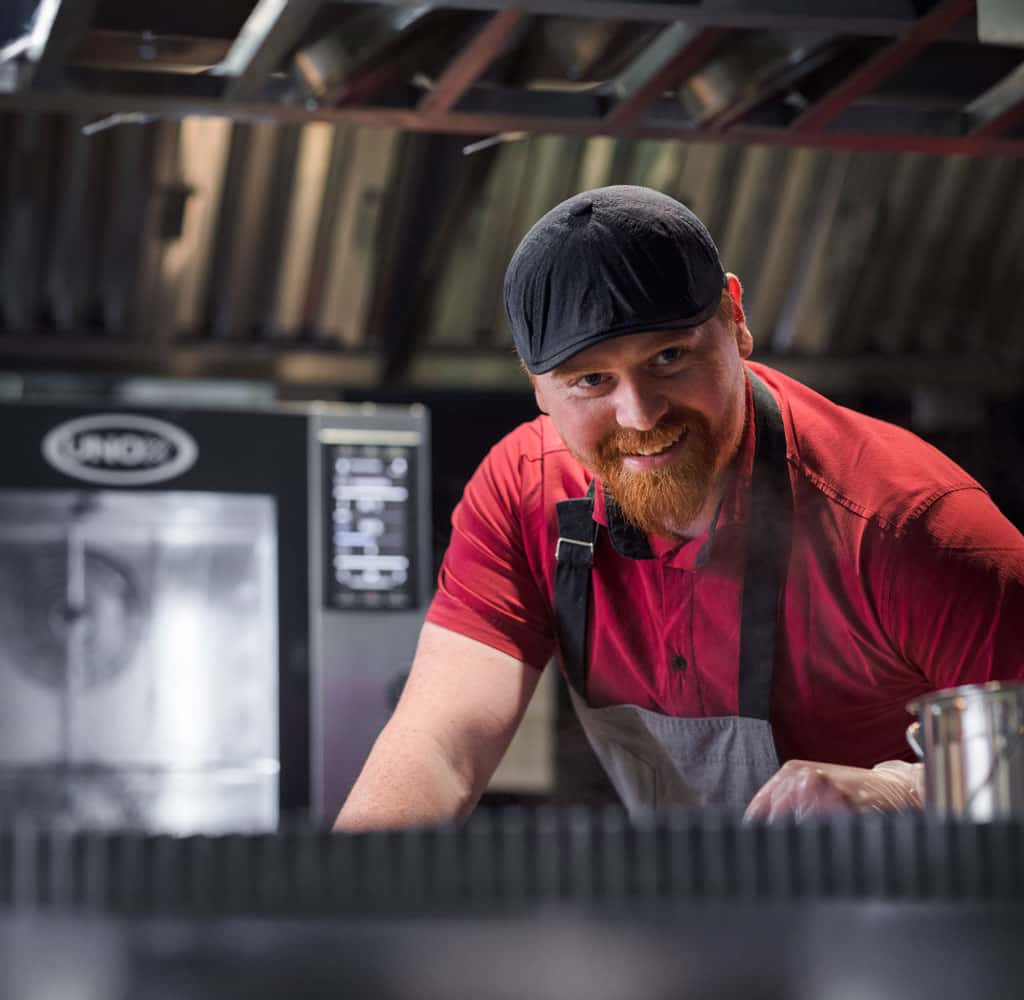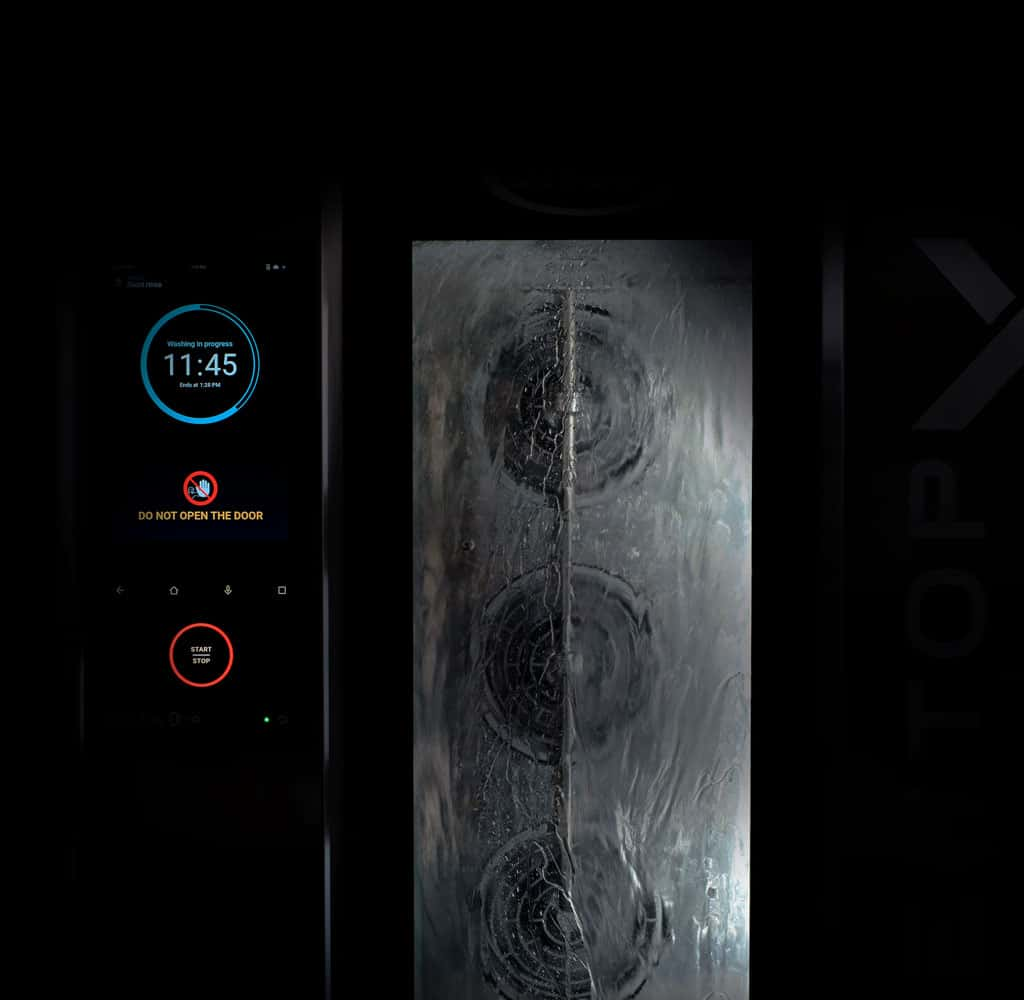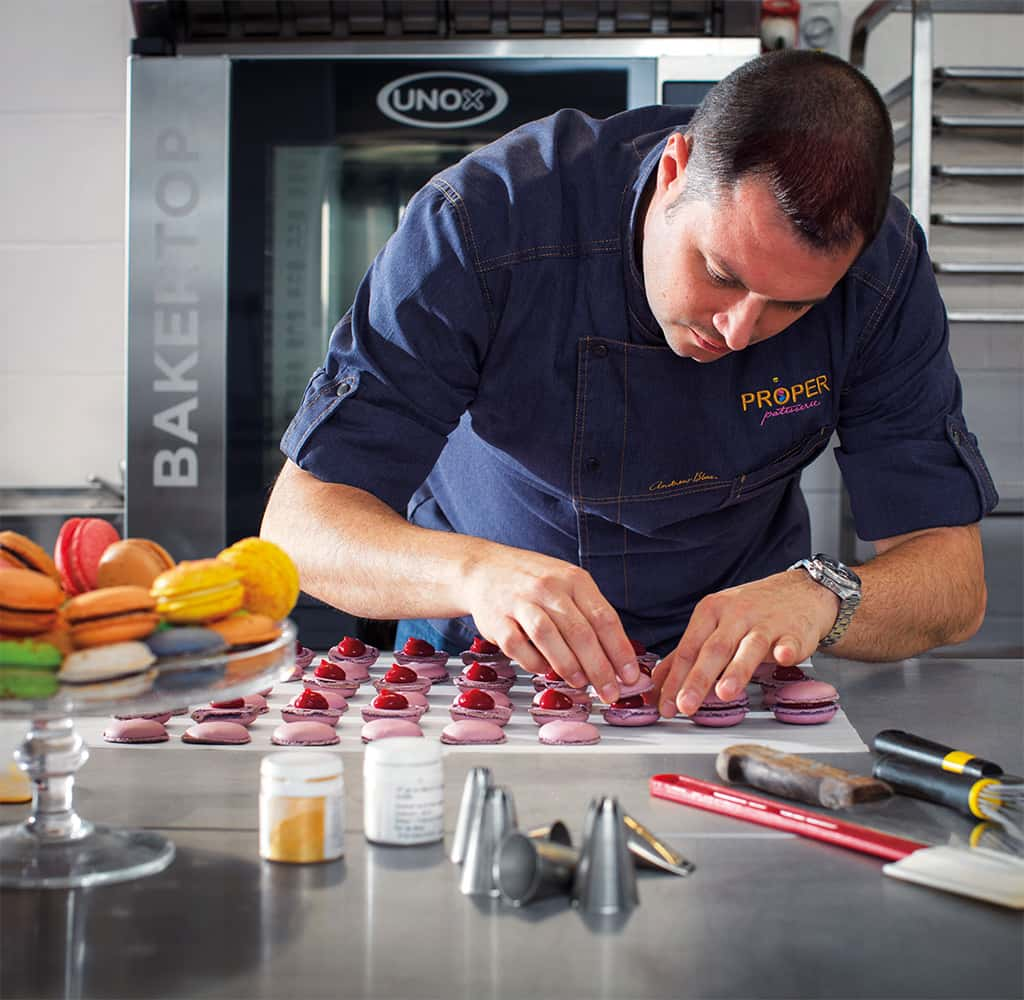What to consider when choosing the best oven for your bakery
Choosing the best commercial oven for your bakery isn’t just about baking quality bread, it’s about improving workflow, optimizing time, and reducing waste. Today’s professionals must handle tight schedules, limited space, and constantly changing staff. That’s why they need tools that make every step simpler and more predictable.
Here are the main factors to consider before buying.
Automation and ease of use
A baker’s day starts early, and there’s no room for mistakes or trial and error. The new generation of commercial ovens simplifies operations thanks to programmable baking cycles, automatic functions, and cloud connectivity.
This means perfectly repeatable cooking, fewer risks of error, and faster, more intuitive staff training. In short, even someone using the oven for the first time can achieve the same result as the most experienced baker.
Space
Anyone working in a bakery knows that space is always limited. Between mixers, proofing chambers, and workbenches, installing an oven can be a challenge. A model that’s too bulky risks slowing down movements and reducing productivity.
The solution is to choose compact or vertically stacked ovens that adapt to the layout of the workspace without sacrificing capacity or performance. In particular, combi ovens in bakeries can replace multiple appliances, freeing up valuable space while keeping workflow smooth even during peak hours.
Versatility
In a modern bakery, the oven isn’t just for bread. Cookies, brioches, focaccias, and even ready meals can all be prepared in the same unit. A versatile piece of equipment, such as a combi oven, allows you to manage different doughs and expand your menu without investing in multiple machines.
In other words: greater variety, less space, and maximum productivity.
Automatic cleaning and hygiene
Anyone who works in a bakery knows that cleaning can become a demanding task at the end of a shift. Professional ovens equipped with automatic washing systems eliminate this burden, ensuring consistent results and impeccable hygiene.
The most advanced models even adjust water consumption based on the level of dirt, helping you save time, reduce waste, and cut costs. A practical solution for those who want to maintain quality without slowing down production.
Consumption and energy efficiency
In bakeries, energy is becoming an increasingly heavy cost factor, but with the right technology, it can be controlled. Choosing a commercial oven built with high-quality insulation materials and automatic energy-saving features, such as standby mode or power adjustment according to the load, can significantly reduce consumption.
For an additional advantage, look for ovens with energy efficiency certifications like ENERGY STAR®, which guarantee high performance and more sustainable operation over time.
Cutting-edge technology for control and precision
The difference between good bread and perfect bread often comes down to just a few degrees of temperature or the right level of humidity. The latest technologies, such as advanced sensors, artificial intelligence, and automatic recipes, precisely regulate every cooking parameter, adapting to the dough type and load conditions.
The result? Uniform baking, consistent quality, and the confidence of achieving the same excellent standard every single day.
A bakery oven must have these three key elements for perfect bread baking
In the previous paragraph, we saw how essential control and precision are to achieving high-quality results. But what are, in concrete terms, the three factors a bakery oven must guarantee for maximum reliability?
And what features truly make it possible to bake different types of bread, from high-hydration doughs to ciabatta and even large loaves, always with the same consistent quality?
Let’s take a look together.
Even heat distribution
What features ensure uniform baking on every tray? A commercial oven for bakeries must guarantee that heat is evenly distributed throughout the entire cooking chamber. Only in this way can you avoid overbaked or underdeveloped areas that affect the crust, crumb, and overall appearance of the final product.
The most advanced professional ovens use optimized ventilation and airflow systems that ensure uniform results across all trays, even when fully loaded.
Stable temperature
What is the ideal temperature for baking bread in a commercial oven? It depends on the type of bread: generally between 200°C and 240°C for traditional loaves, and up to 250–270°C for high-hydration breads such as ciabatta.
More than the temperature itself, its stability is what really matters: even small fluctuations can compromise both crust and crumb. Modern professional ovens maintain consistent heat, guaranteeing uniform results in every batch.
And what about preheating? It’s a crucial step to achieve even browning and proper oven spring. In the new generation of bakery ovens, the process is fully automatic: just start the program, and the oven will preheat itself, notifying you when it’s ready for baking.
Humidity control
How can you achieve a crispy crust and a soft interior with a commercial oven?
Steam is an indispensable ally in baking. Controlling humidity, especially during the initial baking phase, allows the dough to expand properly and form a thin, crisp crust without drying out the surface of the bread.
Today’s professional ovens allow you to precisely adjust humidity levels based on the product type, perfectly adapting to different recipes. The result is bread that’s not only visually appealing but also softer, lighter, and easier to digest.
The limits of traditional commercial ovens for bread
Traditional bakery ovens, such as deck ovens and rotary convection ovens, have long been the benchmark for artisanal bakeries and large-scale production centers. They rely on proven technologies that use either static heat or forced air circulation to ensure even baking and a well-developed crust. But how exactly do they work? Let’s look at the main differences.
A commercial deck oven uses radiant and conductive heat: the bread rests directly on a refractory stone base that absorbs and steadily releases heat throughout the baking process.
A rotary commercial oven, on the other hand, belongs to the convection category. It features a rotating rack that turns during baking, allowing for faster and more uniform heat exposure.
However, while reliable and durable, these ovens show certain limitations when it comes to modern demands for productivity, flexibility, and control:
• Limited control: they do not allow precise management of humidity and airflow, parameters that are essential for adapting to different types of dough and maintaining consistent standards.
• Limited automation: they require specific skills and constant manual intervention, such as monitoring baking processes or adjusting parameters, resulting in a higher risk of error and lower production efficiency.
• Space and productivity: they often have large footprints and are not designed to optimize space, a critical factor in modern bakeries where every square meter must be productive.
• Energy efficiency: compared to next-generation ovens, traditional models are less efficient because they lack intelligent technologies to optimize energy consumption. Heat dispersion and the energy required to rotate the rack further increase waste.
• Longer heating times: they require more time to reach operating temperature, slowing down production start-up and reducing responsiveness during peak demand.
• Hygiene and cleaning: the rack enters the oven directly with its wheels, bringing residues and dirt from the working environment inside. In addition, cleaning is generally manual and often limited to superficial operations, resulting in hygiene standards that are harder to control.
Today, in a sector where higher output with less waste is essential, the technological evolution of commercial ovens has become an indispensable ally for bakeries. Among these innovations, the combi oven stands out as the most complete answer to the everyday challenges of modern bakeries, combining the precision of convection heat, the power of steam, and the effectiveness of dry heat in a single piece of equipment.
How the combi oven meets today’s bakery challenges
The commercial combi oven was designed specifically to overcome the limits of traditional ovens, combining artisanal quality with advanced technology. Here’s how it responds, point by point, to the main challenges every bakery faces.
• Managing a diversified, high-demand production
Versatility is one of the key strengths of the combi oven. Today’s bakeries no longer produce bread alone, but also pastries, focaccia, and deli-style preparations, as well as complementary items such as vegetables, porchetta, or pizza toppings. With a single piece of equipment, it is possible to bake different products by precisely adjusting temperature, humidity, and ventilation according to each recipe.
• Maintaining uniform, high-quality baking results
During fermentation, even the slightest variation in temperature or humidity can compromise the final result. Ensuring consistency is a real challenge, especially with tight schedules, full loads, and multiple operators involved. The combi oven provides precise control of heat, airflow, and humidity—essential parameters for achieving even browning, crisp crusts, and perfect crumb structure, every time.
• Optimizing energy consumption and reducing costs
Energy is a significant cost factor in bakeries, but a modern combi oven makes it possible to reduce consumption even under intensive use. Automatic energy-saving functions and stand-by modes limit waste, while high-performance insulating materials maintain excellent cooking results with reduced energy absorption. In addition, consumption monitoring provides constant visibility into energy use, supporting a more informed and efficient management of operating costs.
• Training new staff and reducing errors
Not everyone in the bakery has the same level of experience. That’s why combi ovens feature intuitive interfaces, programmable recipes, and memorized cooking cycles that enable anyone to achieve consistent results. Cloud connectivity further simplifies recipe control and sharing, significantly reducing the risk of errors.
• Optimizing space in small laboratories or tight kitchens
Combi ovens are designed to maximize space efficiency and productivity, even in the most compact work environments. A traditional rotary oven can occupy more than 4 m², while a column with two combi ovens requires just 1.5 m², offering up to 18 trays of cooking capacity. Two independent cooking chambers also make it possible to manage multiple preparations simultaneously, optimizing time and workflow. This solution replaces multiple pieces of equipment with a single, highly efficient workstation.
• Managing overnight production and ensuring operational continuity
Advanced operating systems allow combi ovens to monitor cooking processes even during nighttime hours, ensuring control, safety, and repeatability without the need for constant supervision. This provides a concrete advantage when organizing multi-shift production and increasing overall laboratory capacity.
• Improving hygiene and contamination control
Most modern combi ovens are equipped with automatic washing systems that reduce labor, water, and energy consumption while ensuring consistently high hygiene standards. After a complete washing, rinsing, and drying cycle, the oven can also be used for specific productions—such as gluten-free baking—helping to minimize the risk of cross-contamination.
This smart solution replaces multiple pieces of equipment in a single workstation, making every square meter of your bakery truly efficient.
Electric or gas combi oven: which is best for your bakery?
Electric or gas commercial combi oven: which one should you choose for your bakery? This is one of the most common questions when purchasing a new commercial oven.
Today, the main difference between the two types lies in operating costs, since in terms of performance, even for bakery products, the gap has now become minimal.
When it comes to power requirements, an oven between 15–20 kW is ideal for artisanal bakeries or small workshops, while models ranging from 30 to 40 kW are better suited for large-scale or continuous production.
So how do you decide?
The choice mainly depends on two factors: operating costs and sustainability.
From a cost perspective, the decision varies according to your country’s energy tariffs. If electricity prices are high, it’s understandable that a professional might prefer a gas oven, which is generally more economical to run. However, with the growing adoption of renewable energy sources and the increasing number of incentives and subsidies available for purchasing energy-efficient commercial ovens, electric options are becoming more competitive, even from a financial standpoint.
This is especially relevant for businesses managing multiple locations or larger operations that must comply with increasingly strict regulations on carbon footprint reduction.
From a sustainability perspective, the commercial electric oven is the ideal choice for those who want to minimize the environmental impact of their bakery. It’s the only technology that allows the use of renewable energy sources, when available, and offers models certified by ENERGY STAR®, a guarantee of energy efficiency and optimized consumption.
How much does a bakery oven cost? Optimize costs and consumption based on your business
How much does a commercial combi oven for bakeries cost on average? As mentioned earlier, the total cost doesn’t just depend on the purchase price, it also includes the overall lifecycle cost of the equipment: energy consumption, maintenance, durability, and energy-saving functions. It’s therefore important to consider how long it will take to amortize your investment, how long a commercial oven typically lasts, and what maintenance programs can extend its lifespan.
In general, professional ovens for bakeries cover a wide price range. Prices start at around €7,000–10,000 for compact models designed for artisanal bakeries or small workshops, up to €12,000–18,000 for mid-range versions with higher production capacity.
The most advanced models, equipped with automatic washing systems, artificial intelligence, and remote connectivity features, can exceed €20,000. However, these should be seen as long-term investments: integrated technologies help reduce errors, optimize energy consumption, and simplify workflow, improving daily efficiency and productivity.
Choosing the right model can seem complex, and manufacturers know it too.
That’s why at Unox, we provide tools designed to make decision-making easier for professionals, such as our Consumption Calculator. Available on our official website, it allows you to analyze energy consumption, emissions, and operating costs based on the actual usage patterns of your bakery.
Simply enter a few data points, such as the amount of bread baked daily or your oven’s operating hours, to get a complete and instant analysis.
In just a few seconds, you’ll know whether your current setup is truly the best choice or if there are more efficient alternatives available.
Why Unox is one of the best commercial oven brands for bakeries
The bakery world is part of Unox’s DNA. Since the 1990s, the very first professional ovens we brought to market were designed specifically for baking bread and croissants.
We quickly stood out as one of the best commercial oven brands for bakeries, thanks to what was then a revolutionary technology, AIR.Maxi, which remains one of our strongest assets today. This system uses multiple fans to evenly distribute air inside the baking chamber, ensuring consistent results across every tray.
Since then, baking professionals have continued to choose and inspire us. Working alongside them has allowed us to deeply understand the dynamics of bakery operations, the production rhythms, the workflow challenges, and the constant need for precision and reliability.
This insight has guided us in developing, testing, and perfecting our professional ovens, continuously evolving our technologies to meet the real needs of modern bakeries.
At Unox, the customer is at the center, not only in product design but throughout the entire experience. Before purchase, our team visits bakeries directly to organize free baking demonstrations, where professionals can test the oven with their own recipes and evaluate its real-world performance.
After purchase, the experience continues with ongoing support, scheduled maintenance, and technological updates designed to tackle today’s challenges and ensure top performance even for the largest players in the industry.
“We have definitely noticed an improvement in both the consistency and precision of our baked products. One of the aspects I appreciate most is how the fans work: they keep the heat constant throughout the chamber, allowing perfectly even baking on both sides. These features enable us to create incredibly delicious products.”
— Felix Carvisiglia, Head Baker at GAIL’s Bakery
GAIL’s Bakery, one of the largest bakery chains in the United Kingdom, found in Unox commercial ovens the perfect answer to its needs.
Watch the video below: we visited their bakery to see firsthand how they use our ovens every day.
Which Unox commercial oven for bread to choose based on your business
Unox’s strength lies not only in addressing the challenges of today’s bakeries with cutting-edge commercial ovens, but also in meeting the diverse needs of every business within the bakery world. From small artisanal workshops to large-scale production chains, there’s a tailor-made Unox solution for every requirement.
Discover which solution best fits your business.
Artisanal bakeries
Which commercial oven should you choose for a small artisanal bakery? The challenges are many and well-known to professionals: ensuring even baking, adapting production to variable daily demand without compromising quality, managing long proofing times and different dough types, all while optimizing energy consumption.
To meet these needs, Unox developed the BAKERTOP MIND.Maps™ combi ovens for bakeries, designed for those seeking precision, versatility, and ease of use.
Equipped with an intuitive interface and automatic baking programs, these ovens allow you to effortlessly switch from leavened doughs to shortcrust pastries, from choux pastry to sponge cakes, and from focaccias to pizzas and panettones, always delivering the same high baking quality.
Advanced technologies such as CLIMALUX™ allow precise control of humidity inside the chamber, while DRY.Maxi™ and STEAM.Maxi™ systems let you switch from 0% to 100% steam in seconds, ensuring the perfect consistency for every baked product.
For an even more advanced experience, Unox has developed BAKERTOP-X™, an intelligent combi oven that revolutionizes work in artisanal bakeries. Thanks to its OPTIC.Cooking smart optical sensor, it automatically recognizes a tray of croissants inserted into the chamber, sets the correct program, and asks for feedback at the end of the baking cycle to learn from your preferences, reducing errors, waste, and working time. And when your hands are busy, you can even control it by voice using the HEY.Unox! function.
A true ally for those who want to maintain artisanal quality with the power and precision of next-generation technology.
Bars, cafés and QSRs
In bars, cafés and other fast-service businesses, speed is the key to success. It’s essential to bake bread, rolls or brioches that stay fresh throughout the day, often starting from frozen products and without a fully equipped production lab.
In these environments, every second and every centimetre count: you need compact, easy-to-use ovens capable of delivering consistent results, even with non-specialized staff, given the high turnover typical of this sector.
Another crucial factor is cleanliness. In venues where the oven is often visible on the counter, it must not only perform exceptionally well but also look elegant and be easy to keep spotless after every use.
To meet these needs, Unox has developed a range of compact and versatile commercial ovens, ideal even for locations with very limited space.
They are simple to use thanks to automatic recipes, intuitive control panels and automatic washing programs, which ensure quick and thorough cleaning at the end of each shift.
CHEFTOP MIND.Maps™ COMPACT is the perfect combi oven for those seeking maximum performance in minimal space. With a depth of just over 60 cm, it fits perfectly into the smallest kitchens while delivering even, flawless baking for every product, from croissants to sandwiches.
For café counters and all QSR environments where speed is essential, Unox offers the SPEED oven range, designed for those who need to guarantee fast service without compromising quality.
SPEED.Pro™ is the first oven capable of combining the performance of a convection oven and a speed oven in a single piece of equipment. It can bake up to four different products simultaneously, maintaining perfect and consistent results, from brioches to sandwiches, from croissants to mini pizzas, with impeccable browning every time.
Nine croissants? It bakes them to perfection in under one minute! And in less than twenty minutes, it can bake up to 30 bread rolls.
When space is limited, BAKERLUX SHOP.Pro™ comes into play: Unox’s convection oven with humidity, designed to deliver bakery-level performance in a compact format, ideal for bakery and café countertops. It is engineered to regenerate and brown frozen baked goods in high-pace, high-volume environments. Controlled ventilation and precise humidity regulation ensure consistently flawless results. And when an extra boost is needed, STEAM.Boost doubles steam production in the first minutes of baking, delivering bread with a golden, glossy finish.
For those looking for even faster performance in the smallest possible footprint, SPEED.Compact™ ECO is the professional accelerated cooking oven that, with its ultra-compact design and a door opening of just 17 cm, can bake a savory croissant or a quiche in as little as 30 seconds. With SPEED.Compact, cleaning operations are also simplified thanks to the innovative QUICK.Rinse kit, designed for fast and easy washing.
Supermarkets and in-store bakery corners
What is the most suitable commercial oven for bakeries with direct sales or supermarket in-store bakery corners? Buying fresh bread directly in supermarkets has become increasingly common. To meet consumers’ new habits, more and more retail stores now feature a bakery corner, offering freshly baked products throughout the day.
In these contexts, the challenges are clear: high productivity, repeatable results throughout the day, continuous baking with consistent quality, and the ability to fit into the limited space typical of bakery departments.
The ideal solution for an in-store bakery is to combine the performance of a combi oven with the flexibility of two independent stacked baking chambers, allowing multiple product types to be baked simultaneously.
Unox combi ovens for bakeries are also available in vertical configurations, maximizing space efficiency and boosting productivity.
Industrial bakeries and production centers
What is the most efficient commercial oven for continuous production? In large-scale bakery labs and industrial production centers, the challenges are well defined: a high-capacity commercial oven is needed, one capable of baking large quantities per hour, automating processes to guarantee efficiency and consistency, and intelligently managing digital monitoring of baking parameters to optimize both time and energy use.
For these needs, Unox developed the BAKERTOP MIND.Maps™ BIG range, trolley combi ovens designed for industrial bakeries and large-scale production.
Thanks to their power and precision, they deliver uniform, high-quality results even with full loads, minimizing waste.
In just 25 minutes, they can bake up to 144 ciabattas, and in less than 20 minutes, up to 192 croissants, perfectly risen and golden from the first to the last tray.
Engineered for intensive, continuous use, Unox industrial bakery ovens feature a marine-grade stainless steel baking chamber, ensuring maximum durability and long-term resistance.
For those who want to make the most of their space without sacrificing capacity, the CHEFTOP MIND.Maps™ BIG COMPACT model is also available. With a depth of just 100 cm, it can accommodate up to 20 trays, guaranteeing high performance in a more compact format.
Finally, with the advanced Unox DDC (Data Driven Cooking) platform, you can remotely monitor multiple commercial ovens, analyze consumption, and share recipes and programs with a single click.
This integrated system allows you to maintain full control over production, improve efficiency, and standardize results across all your locations.
What are the best Unox accessories for commercial bakery ovens?
Which accessories or trays are essential for a commercial oven in a bakery?
In addition to technologies designed specifically for the bakery world, Unox offers a complete range of accessories developed to optimize every stage of the baking process, from proofing to baking, ensuring perfect results every time.
Unox static ovens for bakeries
For stone-baked traditional products such as bread, focaccia and other leavened doughs, the ideal solution is DECKTOP, the Unox static oven for bakeries.
It delivers authentic results with a crisp crust and even browning, just like in traditional artisanal baking.
LIEVOX
The Unox proofing unit features fans that evenly and precisely control temperature and humidity, ensuring stable and consistent proofing in any condition, even in high-volume production environments.
BAKE.Rest and QUICK.Load trolleys
To simplify daily operations, QUICK.Load enables safe loading and unloading of up to 18 trays in just a few seconds, while BAKE.Rest is designed to make cooling and overturning freshly baked products easier.
It’s especially useful for specialties like Italian panettone and colomba, which must cool upside down to prevent the dome from collapsing and to preserve their signature softness and internal structure.
While there are specific baking trays for these products, allowing manual inversion for cooling, BAKE.Rest makes the process faster, safer, and more precise, minimizing the risk of burns and ensuring consistently perfect results.
Both accessories are made of AISI 316L stainless steel, synonymous with durability, hygiene, and long-lasting performance.
Specialized bakery trays
Unox baking trays are engineered to enhance cooking quality and product performance.
From FAKIRO.GRILL, which delivers perfect crispness thanks to its dual smooth and ribbed surface, to FORO.SILICO, featuring micro-perforations and a high-temperature-resistant silicone coating that ensures even baking across the entire tray.
For more specific needs, Unox also offers trays dedicated to particular bread shapes, such as FORO.BAGUETTE.BLACK, designed to support the dough’s form, providing ideal browning and perfectly developed structure.
Ready to take your bakery to the next level?
Discover our full range of solutions on our page dedicated to commercial ovens for the world of baking and pastry!
